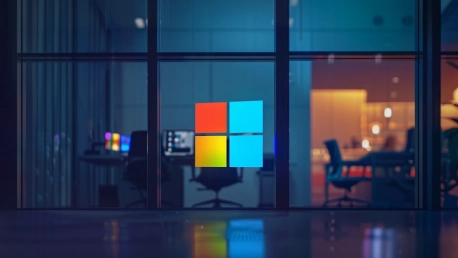The retail industry is undergoing a significant transformation driven by cutting-edge technologies like the Internet of Things (IoT), 5G, artificial intelligence (AI), and machine learning (ML). Leveraging Microsoft Cloud as a foundational platform, these technologies are redefining how retailers manage their supply chains, enhance customer experiences, and achieve sustainability goals. This transformation is not merely a futuristic vision but a present reality, as retailers increasingly rely on these advanced technologies to stay competitive and meet evolving consumer demands.The integration of IoT, 5G, and AI/ML within retail operations facilitates unprecedented levels of efficiency and data accuracy. Smart sensors, RFID tags, and real-time data transmission enabled by 5G networks ensure that every aspect of the supply chain operates smoothly and efficiently. In addition, Microsoft Cloud provides the robust framework necessary for analyzing enormous amounts of data collected from various sources. By doing so, retailers can optimize stock levels, reduce environmental impact, and offer a seamless, personalized shopping experience. This article explores the multifaceted impacts of these technologies on the retail sector.
Driving Integration and Operational Efficiency with IoT and 5G
In today’s fast-paced retail environment, efficiency is key, and IoT and 5G technologies are proving instrumental in driving this efficiency by enabling real-time data collection and seamless communication across the retail supply chain. IoT devices, such as smart sensors and RFID tags, gather vast amounts of data on inventory levels, product movement, and store conditions. This data is then transmitted instantly via 5G networks, ensuring that retail operations are always running on the most current information. The culmination of these technologies creates a dynamic, responsive supply chain that can adapt to ever-changing market conditions.By integrating this data into Microsoft Cloud, retailers can analyze it to optimize various facets of their operations. For example, smart inventory management systems powered by IoT can automatically reorder stock as it runs low, reducing the risk of out-of-stock scenarios and ensuring product availability. Additionally, connected devices monitor equipment health in real-time, enabling predictive maintenance that prevents costly downtime and repairs. This not only maintains operational continuity but also enhances the overall efficiency of retail processes, from logistics to customer service.Moreover, these technologies facilitate improved warehouse management. IoT-enabled devices track goods from the point of origin to their destination, allowing for real-time visibility into the status and location of shipments. This tracking capability, combined with the high-speed, low-latency connectivity provided by 5G, ensures that products move through the supply chain swiftly and efficiently, reducing delays and operational bottlenecks. The seamless flow of goods enabled by these technologies translates to faster delivery times and heightened customer satisfaction. In an era where speed and reliability are paramount, the combined power of IoT and 5G offers retailers a significant competitive edge.
Enhancing Sustainability and Energy Efficiency with AI/ML
Sustainability is becoming an increasingly important focus for retailers, both to meet regulatory requirements and to satisfy consumer demand for more environmentally responsible practices. AI and ML are playing a critical role in advancing these sustainability efforts, particularly in the area of energy management. By leveraging AI/ML algorithms, retailers can predict and optimize energy consumption, leading to significant reductions in both energy use and costs. This strategic use of data and analytics not only contributes to sustainability goals but also offers a tangible return on investment through cost savings.For instance, in warehouses and stores, AI/ML solutions can regulate heating, ventilation, and air conditioning (HVAC) systems based on real-time factors such as occupancy levels, outside weather conditions, and times of peak usage. This dynamic adjustment ensures that energy is used efficiently, without compromising the comfort of customers and staff. Similarly, AI-driven models can optimize lighting schedules, ensuring that lights are only on when necessary. This intelligent energy management can lead to substantial reductions in electricity use, thereby cutting both costs and carbon emissions.Another area where AI/ML boosts sustainability is in refrigeration management. In grocery stores and other retail environments that require cooling, AI algorithms can adjust refrigeration settings based on factors like external temperatures and the rate of door openings, maintaining optimal cooling levels while minimizing energy consumption. These applications not only cut costs but also support broader green initiatives by lowering the retailer’s carbon footprint. By integrating sustainability into core operational processes, retailers can contribute to environmental stewardship while also reaping financial benefits.
Optimizing Logistics and Delivery with AI/ML
Effective logistics and delivery are crucial components of retail success, and AI/ML technologies are revolutionizing these operations by enhancing delivery route planning and load efficiency. AI-driven logistics programs, such as TCS DigiFleet, analyze factors like traffic patterns, road conditions, and historical delivery times to determine the most efficient routes. This optimization reduces fuel consumption and speeds up delivery times, leading to lower operational costs and a better customer experience. The ability to navigate logistical challenges with precision offers retailers a substantial advantage in a competitive marketplace.Furthermore, AI/ML-enabled visual analytics and IoT sensors enhance load efficiency in trucks, ensuring that each vehicle is used to its maximum capacity. This not only decreases the number of trips required but also minimizes the likelihood of damaged goods by ensuring proper loading techniques. Additionally, AI-powered systems can predict potential delays and reroute deliveries in real-time, ensuring timely arrivals even when unexpected issues arise. By optimizing every aspect of logistics, from route planning to load management, AI and ML technologies contribute to smoother, more reliable delivery processes.In the context of last-mile delivery, AI and ML can identify the best delivery times based on customer preferences and local traffic conditions, enhancing delivery efficiency and customer satisfaction. For instance, using predictive analytics, companies can anticipate when a customer is likely to be home, reducing the chances of failed delivery attempts and ensuring a smoother delivery process. This focus on precision and reliability in delivery not only elevates the customer experience but also enhances the overall reputation and efficiency of the retailer.
Revolutionizing Customer Experiences with Cloud-Driven Technologies
The retail industry is experiencing a profound transformation, driven by cutting-edge technologies like the Internet of Things (IoT), 5G, artificial intelligence (AI), and machine learning (ML). Powered by Microsoft Cloud, these innovations are reshaping how retailers manage supply chains, enhance customer experiences, and achieve sustainability targets. This shift is not just a glimpse into the future, but a current reality, as retailers increasingly adopt these advanced technologies to stay competitive and meet evolving consumer demands.IoT, 5G, and AI/ML integration in retail operations enable remarkable efficiency and data precision. Smart sensors, RFID tags, and 5G-enabled real-time data transmission ensure smooth supply chain operations. Furthermore, Microsoft Cloud offers the vital infrastructure for analyzing vast amounts of data gathered from multiple sources. This capability allows retailers to optimize inventory, minimize environmental impact, and deliver a seamless and personalized shopping experience. This article delves into the multifaceted effects of these technologies on the retail sector.









